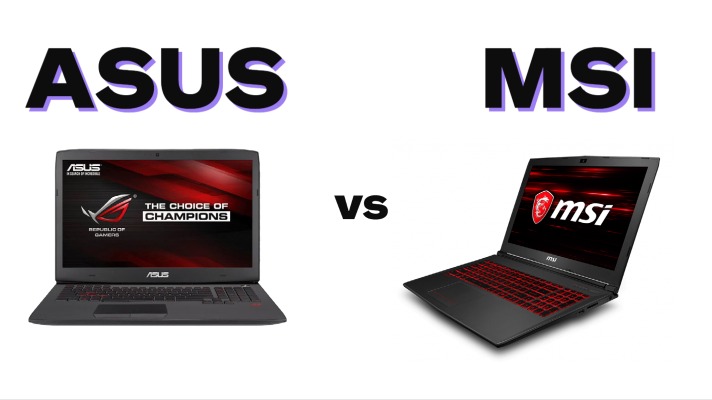Asus vs MSI: who wins the battle? We have dedicated quite a few blog posts to both Asus and MSI laptops in the past, and it is safe to say that both brands manufacture some great gaming gadgets. But is one better than the other? Let??s find out.

Please note that both Asus and MSI produce a wide range of computer components and peripherals, but in this post we will be discussing gaming laptops. It would also be rather pointless to try and compare the specs, since there were so many gaming lines and configurations released by Asus and MSI over the years. Instead, we will take a look at the type and quality of hardware components, as well as at how it all comes together in a gaming environment.
MSI vs Asus: Design
Both brands came up with some dazzling and often futuristic looking gaming laptops over the years, yet there is one rather prominent distinction, when it comes to overall appearance. Lately the MSI has been putting a heavy focus on designing slim and stylish devices, with sleek and minimal finishes. MSI GS66 Stealth would be the great example of a durable and portable gaming machine. Even their 17.3-ich series laptops are quite thin and relatively lightweight.

Asus ROG (Republic of Gamers) computers on the other hand are known for their somewhat bulky and even intimidating look. And while pretty much any newer MSI gaming laptop could easily pass for a business one, when you look at Asus ROG you immediately recognize a gaming device.

Republic of Gamers laptops have fun, almost 3D-like chassis, especially appealing to younger hard-core gamers. Though, Asus took a 180 with their Zephyrus ROG line, adapting the thin-and-portable design style. Just take a look at the Asus Zephyrus M15 gaming laptop, for instance.
Asus vs MSI: Asus Strong Points
Asus gaming computers are designed to be long-lasting, both on the outside and inside. Laptop chassis are always made with durable components.
Asus actually started out with manufacturing motherboards long before they decided to open their gaming laptops division. Now they also make graphics cards, power supplies, cooling systems and many more. So when it comes to building a high-performing gaming laptop, they know how to do it right. Asus have been recognized and awarded for their products on numerous occasions and even was named among World’s Most Admired Companies by Fortune magazine in 2018. Asus is confident in the quality of their products and all their laptops come with a 24-month free warranty. All other brands do a standard 12-month. Anything more would usually cost you extra.
Asus Downsides
Because the brand has their hand in parts manufacturing, they have the ability to update and upgrade gaming laptop lines all the time. Which feels more like a downside, rather than a merit, as those good working sturdy laptops rapidly become outdated and replaced by newer models. The lifespan of an Asus laptop becomes even shorter, and while other big tech companies are pledging to become more sustainable, Asus seems to be moving backwards.
Our Favorite Asus Gaming Laptops
- Asus ROG Zephyrus S series is an all-around beautiful gaming laptop. And if you are willing to splurge on the NVIDIA GeForce RTX 2080 configuration, well, there is no stopping you.
- Asus ROG Zephyrus G14 would be another great example of a powerful and portable 14-inch gaming laptop. And it is also AMD Ryzen based: a CPU series that are rapidly becoming mainstream in the laptop gaming industry.
- Now the Asus ROG Strix GL703 is a bit older and much heavier, but it makes a great workstation + gaming laptop and holds great reselling value.
MSI Overview
Micro-Star International or MSI also manufactures components and peripherals, yet when it comes to computers, ulike Asus, they primarily make gaming devices. After all, MSI is known as a gaming brand. And they produce the most advanced gaming laptops and computer components on the market.
Scrolling through MSI??s website selection of gaming laptops, you immediately notice that all of them are equipped with the latest 11th generation Intel processors and NVIDIA RTX 20 / RTX 30 series graphics cards, as well as the AMD Radeon RX (5500M) one. You get two standard screen size options: 15.6 and 17.3-inch panels. Both are available in 4K resolution.
MSI Gaming Laptops Downsides
Most gaming laptops, regardless of the make, notoriously overheat. And the MSI brand is no exception. Being one of the leaders in the laptops industry, unfortunately it seems that the manufacturer is unable to solve this issue. Not as of yet, anyways. Another major downside would be the price tag: their gaming laptops are expensive and usually cost more than the average in their class. But in the MSI vs Asus stand-off, the latter does not really win points here either.
Our Top MSI Laptop Picks
- MSI GE75 Raider: being a 17.3 inch laptop, it is ruther bulky and somewhat on the heavy side, but it is oh so worth it! GE75 series is the beast of a laptop, any pro-level gamer would be delighted to get their hands on.
- MSI GS65 Stealth Thin: this model portable, it looks cool and professional, which makes it a great business laptop. 15.6 inch display allows for opening multiple web browser windows and tabs, and even an occasional split-screen. And needless to say, it can handle some heavy serious AAA list games, like Battlefield V, for example.
MSI vs Asus: Final Thoughts
As we have established, both Asus and MSI gaming laptops have their pros and cons. The purpose of this post is to merely help you make an educated purchase decision. But essentially, picking the better of the two would be a subjective judgement. However, it is worth noting that MSI as well as Asus pre-owned gaming laptops equally hold solid reselling value. Even the older models are capable of running some of the AAA games fine, if properly maintained. And if you must stay on trend and have all the latest tech, selling your older Asus or an MSI laptop might be a great way to offset the cost of the upgrade. You can see your laptop trade-in value in real time, checkout in a matter of minutes, and get paid as fast as in three days, start to finish!*
*Transaction duration from checkout to completion depends on the customer’s location and preferred payment method and may take anywhere from 2 to 12 business days.










